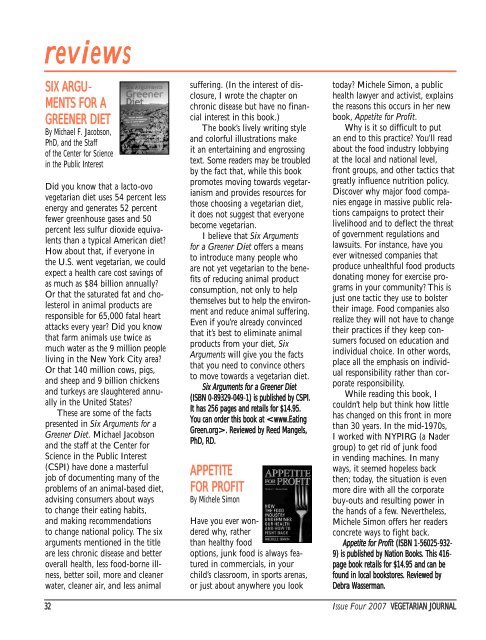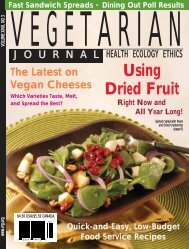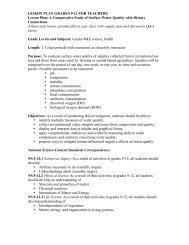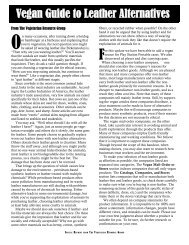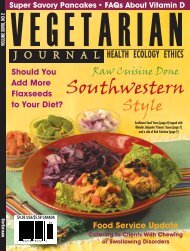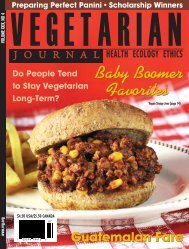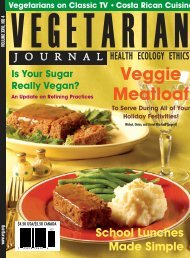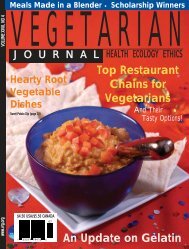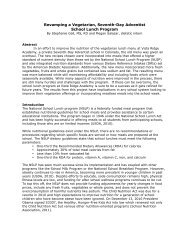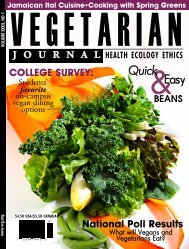Is Your Sugar Vegan? - The Vegetarian Resource Group
Is Your Sugar Vegan? - The Vegetarian Resource Group
Is Your Sugar Vegan? - The Vegetarian Resource Group
You also want an ePaper? Increase the reach of your titles
YUMPU automatically turns print PDFs into web optimized ePapers that Google loves.
eviews<br />
SIX ARGU-<br />
MENTS FOR A<br />
GREENER DIET<br />
By Michael F. Jacobson,<br />
PhD, and the Staff<br />
of the Center for Science<br />
in the Public Interest<br />
Did you know that a lacto-ovo<br />
vegetarian diet uses 54 percent less<br />
energy and generates 52 percent<br />
fewer greenhouse gases and 50<br />
percent less sulfur dioxide equivalents<br />
than a typical American diet<br />
How about that, if everyone in<br />
the U.S. went vegetarian, we could<br />
expect a health care cost savings of<br />
as much as $84 billion annually<br />
Or that the saturated fat and cholesterol<br />
in animal products are<br />
responsible for 65,000 fatal heart<br />
attacks every year Did you know<br />
that farm animals use twice as<br />
much water as the 9 million people<br />
living in the New York City area<br />
Or that 140 million cows, pigs,<br />
and sheep and 9 billion chickens<br />
and turkeys are slaughtered annually<br />
in the United States<br />
<strong>The</strong>se are some of the facts<br />
presented in Six Arguments for a<br />
Greener Diet. Michael Jacobson<br />
and the staff at the Center for<br />
Science in the Public Interest<br />
(CSPI) have done a masterful<br />
job of documenting many of the<br />
problems of an animal-based diet,<br />
advising consumers about ways<br />
to change their eating habits,<br />
and making recommendations<br />
to change national policy. <strong>The</strong> six<br />
arguments mentioned in the title<br />
are less chronic disease and better<br />
overall health, less food-borne illness,<br />
better soil, more and cleaner<br />
water, cleaner air, and less animal<br />
suffering. (In the interest of disclosure,<br />
I wrote the chapter on<br />
chronic disease but have no financial<br />
interest in this book.)<br />
<strong>The</strong> book’s lively writing style<br />
and colorful illustrations make<br />
it an entertaining and engrossing<br />
text. Some readers may be troubled<br />
by the fact that, while this book<br />
promotes moving towards vegetarianism<br />
and provides resources for<br />
those choosing a vegetarian diet,<br />
it does not suggest that everyone<br />
become vegetarian.<br />
I believe that Six Arguments<br />
for a Greener Diet offers a means<br />
to introduce many people who<br />
are not yet vegetarian to the benefits<br />
of reducing animal product<br />
consumption, not only to help<br />
themselves but to help the environment<br />
and reduce animal suffering.<br />
Even if you’re already convinced<br />
that it’s best to eliminate animal<br />
products from your diet, Six<br />
Arguments will give you the facts<br />
that you need to convince others<br />
to move towards a vegetarian diet.<br />
Six Arguments for a Greener Diet<br />
(ISBN 0-89329-049-1) is published by CSPI.<br />
It has 256 pages and retails for $14.95.<br />
You can order this book at . Reviewed by Reed Mangels,<br />
PhD, RD.<br />
APPETITE<br />
FOR PROFIT<br />
By Michele Simon<br />
Have you ever wondered<br />
why, rather<br />
than healthy food<br />
options, junk food is always featured<br />
in commercials, in your<br />
child’s classroom, in sports arenas,<br />
or just about anywhere you look<br />
today Michele Simon, a public<br />
health lawyer and activist, explains<br />
the reasons this occurs in her new<br />
book, Appetite for Profit.<br />
Why is it so difficult to put<br />
an end to this practice You’ll read<br />
about the food industry lobbying<br />
at the local and national level,<br />
front groups, and other tactics that<br />
greatly influence nutrition policy.<br />
Discover why major food companies<br />
engage in massive public relations<br />
campaigns to protect their<br />
livelihood and to deflect the threat<br />
of government regulations and<br />
lawsuits. For instance, have you<br />
ever witnessed companies that<br />
produce unhealthful food products<br />
donating money for exercise programs<br />
in your community This is<br />
just one tactic they use to bolster<br />
their image. Food companies also<br />
realize they will not have to change<br />
their practices if they keep consumers<br />
focused on education and<br />
individual choice. In other words,<br />
place all the emphasis on individual<br />
responsibility rather than corporate<br />
responsibility.<br />
While reading this book, I<br />
couldn’t help but think how little<br />
has changed on this front in more<br />
than 30 years. In the mid-1970s,<br />
I worked with NYPIRG (a Nader<br />
group) to get rid of junk food<br />
in vending machines. In many<br />
ways, it seemed hopeless back<br />
then; today, the situation is even<br />
more dire with all the corporate<br />
buy-outs and resulting power in<br />
the hands of a few. Nevertheless,<br />
Michele Simon offers her readers<br />
concrete ways to fight back.<br />
Appetite for Profit (ISBN 1-56025-932-<br />
9) is published by Nation Books. This 416-<br />
page book retails for $14.95 and can be<br />
found in local bookstores. Reviewed by<br />
Debra Wasserman.<br />
32 <strong>Is</strong>sue Four 2007 VEGETARIAN JOURNAL


